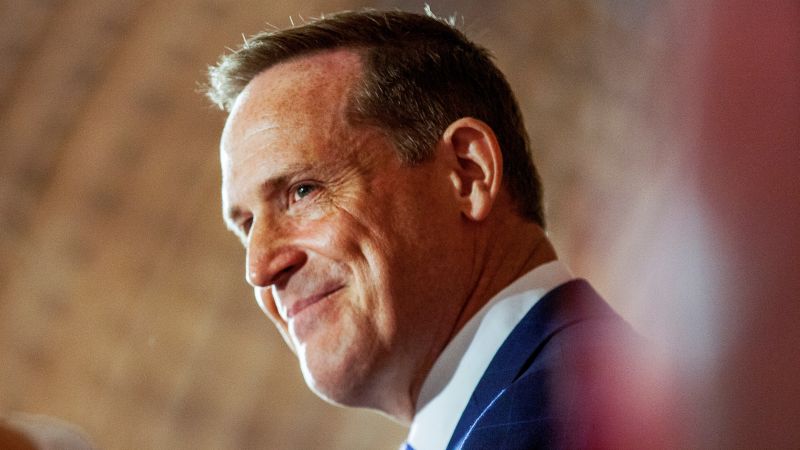
As he has campaigned for a promotion to the Senate, Ted Budd has been frequently absent from his day job: A member of the US House.
The North Carolina Republican missed more votes than all but three House members since January 2021 – and more than any lawmaker who will be on the ballot in next Tuesday’s elections, according to an analysis by a nonpartisan watchdog group, the Moonlight Foundation. Budd missed 119 votes in this Congress, amounting to 13% of all votes over the last two years, most of which came this year as he has campaigned in North Carolina to fill the seat of the retiring Sen. Richard Burr.
It’s not unusual for members to skip votes in an election year when campaigning for higher office, though doing so often opens them up to criticism from their rivals. GOP Rep. Lee Zeldin, who is running for governor in New York, skipped 115 votes out of the 926 cast this Congress – the sixth most amount of missed votes in the House, the analysis said.
Members who are retiring often are among the most likely to skip votes. Illinois Rep. Adam Kinzinger, a Republican member of the January 6, 2021, select committee who announced last year he wouldn’t run for office in 2022, was absent for 298 votes over the last two years, the most in the House. Other retiring lawmakers – like Democrat Mike Doyle of Pennsylvania – also made the top five.
“While no one demands a perfect voting record, eroding public trust in the political system by not showing up to vote is inexcusable,” said Karen Goll, the executive director of the Moonlight Foundation.
The analysis also underscores another problem with how the House operates: The proxy voting system.
Under rules pushed by Speaker Nancy Pelosi amid the start of the Covid-19 pandemic and continued as the country has returned to a sense of normalcy, lawmakers can vote while away from Washington by authorizing another member to vote on his or her behalf – so long as they sign a letter to the House clerk stating they can’t attend the vote because of the “ongoing public health emergency.” But members in both parties often abuse the system and falsely make that claim so their colleagues can vote on their behalf and allow them to stay in their home districts or engage in personal matters.
That means members who would ordinarily be marked as absent are registered as voting that day, obscuring their truancy from the public and ensuring their leaders have enough votes to deal with a bill on the floor.
Both Reps. Kevin Brady, a retiring Texas Republican, and Rep. Liz Cheney, a Wyoming Republican also on the January 6 committee who was defeated in her primary over the summer, missed the second and third most amount of House votes over the past two years, respectively. But neither Cheney nor Brady have filed proxy letters this Congress asking for members to vote for them.
“Congressman Brady does not proxy vote and was at work in Congress nearly every day votes occurred,” said Janet Montesi, Brady’s spokesperson. “During several long, unnecessary vote series on dozens of non-controversial suspension bills, Congressman Brady chose instead to continue his vital Ways and Means Committee work to defeat the misguided tax hikes and inflation-inducing spending in President Biden’s Build Back Better scheme.”
A Cheney spokesperson declined to comment.
Budd has a similar negative view of proxy voting and even cosponsored legislation to withhold pay of any member who votes remotely, with his campaign saying he “puts his money where his mouth is.” But on four occasions, he did file letters with the House clerk designating a member to vote by proxy on his behalf because of the Covid-19 pandemic, even voting remotely several times at the end of September.
Pelosi and her Democratic leadership team crafted a relatively light voting schedule in Washington this year since vulnerable Democrats are far more eager to campaign back home and try to hold onto the House. And often when they’re in Washington, House floor time is consumed by roll call votes over largely non-controversial matters that would otherwise be dealt with expeditiously if not for a handful of conservative lawmakers using parliamentary moves to tie up the floor for hours at a time.
But allowing the proxy voting system to continue has helped Pelosi ensure she can lock down enough votes to pass bills in the narrowly divided chamber even when members are not in Washington. Indeed, Rep. Tim Ryan, the Democrat running in the competitive Ohio Senate race, filed 49 letters asking a colleague to vote on his behalf due to the pandemic, the second most in the House, the analysis said.
Asked about his proxy votes, Ryan spokesperson Jordan Fuja said the congressman “will never apologize for spending more time” in his state.
“It’s 2022, and members of Congress should be able to use technology at their disposal to do their jobs and vote remotely while meeting face-to-face with the people they serve,” Fuja said.
Other members didn’t proxy vote or vote in person at all.
Among the bills that Budd, for instance, missed include ones dealing with providing cybersecurity grants for schools, bolstering oversight on veterans programs, awarding the Congressional Gold Medal to the National Hockey League’s first Black player and providing protections for whistleblowers.
In a statement, the Budd campaign attacked CNN, the national media, the Moonlight Foundation and its analysis – and defended Budd’s voting record.
Jonathan Felts, a senior Budd adviser, pointed to a report in McClatchy that said the congressman had “one of the better attendance records” of the 13-member North Carolina House delegation before his Senate campaign took shape. The same report said that Budd missed more than 100 votes since running for Senate, “far above the median lifetime record of missed votes.”
Felt said that the North Carolina media “have pointed out Ted Budd had one of the best vote records prior to the last several months of the U.S. Senate campaign.”
Representatives for the other lawmakers mentioned here either did not respond to a request for comment or declined to comment.
While most lawmakers stay in their seats as they campaign for higher office despite missing many votes – as presidential candidates ranging from Barack Obama to Ted Cruz have done – some have resigned their seats to focus exclusively on their campaigns. Charlie Crist resigned his House seat last August after winning the Florida Democratic gubernatorial primary, for instance, and Bob Dole also stepped aside in 1996 as the Kansas senator and Senate GOP leader ran for president. But that is far from the norm.
“Voting is a sacred bond between lawmakers and their constituents,” Goll said. “All too often lawmakers violate this trust by not voting in Congress, causing millions of Americans to lose their voice in Washington and lose trust in the system.”
CNN’s Ted Barrett contributed to this report.



